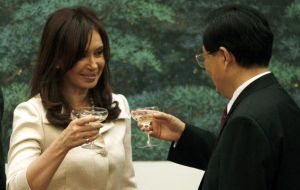MercoPress. South Atlantic News Agency
“Discriminatory trade” measures could limit Chinese interest in Argentina
 In spite of smiles and promises, Mrs Kirchner and Hu Jintao can’t agree on soy-oil
In spite of smiles and promises, Mrs Kirchner and Hu Jintao can’t agree on soy-oil As China is gaining ever wider economic influence, Argentina runs the risk of losing the opportunity to benefit from the trend by keeping discriminatory measures against Chinese products, an Argentine expert warned.
Lucio Castro, a researcher with the Equity and Growth Implementation Centre, made the remarks in an interview with Xinhua, China’s official news agency.
Out of China's direct foreign investments (DFI) in 2010, about 17% would go to Latin America and the Caribbean, according to Castro's estimate.
“The diversification of the access to raw materials and energy, the consolidation of the trans-national production networks and domestic rebalancing process” are the major factors triggering China's investment boom around the world, he said, adding that Argentina has failed to take the chance.
“The discrimination against China affects Argentine to have more of those investments...that is why Argentina is in the third place on the Continent as investment receiver, behind Brazil and Peru,” Castro said.
The anti-dumping measures and the enforcement of non-automatic licenses have made the entry of products difficult, Castro said.
Between 2009 and the first quarter of 2010, the number of measures against Chinese products taken by Argentina accounts for over half of all such cases launched by Latin American countries.
“Latin America is an important destination of China's DFI. However, where the total investment is concerned, Latin America's share is minor. Sixty percent goes to Asia. But even so, Argentina still has to work more and generate an attraction strategy, focused on promoting the integration of local companies with Asian trans-national production networks with China as an axis,” he said.
Castro said Argentina “has to take an intense action” to reverse the current situation and together with Chile to “strengthen the transportation infrastructure, mainly to Asia-Pacific, to reduce production costs”.
Argentina should “develop a double strategy: one is to attract Chinese investment directed to transportation, mining, paper-making and petro-chemistry; on the other hand, to invest in third world countries, mainly in developing processed food and service export,” he said.
The Chinese economy will continue to grow and “Argentina must understand that” Castro added.
In related news the Buenos Aires Cereal and Oilseeds exchange said that there is “no solution in sight” for the conflict with China regarding soy oil which started last March.
Furthermore, following the trade incident with China, Argentina’s soy oil is selling “at 76 US dollars cheaper per ton than Brazilian oil”, which impacts along the commercial chain all the way to the farmer.
China’s ban on Argentine soy-oil imports came as a reprisal following on the numerous restrictions and ‘dumping claims’ imposed by the Kirchner administration on Chinese products. President Cristina Kirchner recently travelled to Beijing on an official state visit but in spite of announcements, negotiations remain stalled and soy-oil sales to China frozen.
Argentina is the world’s main exporter of soy oil with over 50% of the market and China the main importer, and it is no surprise that the two countries were the main partners in the item’s trade. In practical terms this means that 75% of soy bean and 31% of soy oil exports from Argentina have China as their market. From China’s end Argentina normally supplies 78% of soy oil and 22% of soy beans. Argentine soy exports represented 14 billion USD in 2009, 25% of the country’s total.
Currently Argentina is shipping soy oil to India, Bangladesh and Iran but at a lower price than to China and 76 US dollars below the price of Brazilian soy




Top Comments
Disclaimer & comment rules-

-

-

Read all commentsCurrently Argentina is shipping soy oil to India, Bangladesh and Iran but at a lower price than to China and 76 US dollars below the price of Brazilian soy
Aug 13th, 2010 - 08:39 am 0Result misery as Wilkins Micawber would say
Yeah, always crying Oil exporters should meet China new sanitary measures and that’s it.
Aug 13th, 2010 - 08:52 am 0And Chinese should stop the dumping of manufacture products to Argiland.
Agri-Business always wanted others to pay for their fault no way. Keep selling cheaper to India who cares after all Indian get some benefit by paying less.
They love Adam Smith and the Chicago boys so why not to start to practicing some stuff of free market ideology?
Improve the product to the standard that the Client demands, the estate should not intervene at all.
Because make us look socialist, hahaha.
Keep selling cheaper to India who cares after all Indian get some benefit by paying less.
Aug 13th, 2010 - 09:17 am 0Philanthropy WAY TO GO LOL
Commenting for this story is now closed.
If you have a Facebook account, become a fan and comment on our Facebook Page!